Social Values Texts
Our co-founder Michael Adams has drawn on the Social Values research pioneered by Environics to write seven fascinating books that chart the evolution of values in North America, including four Canadian bestsellers.
Could It Happen Here?
Canada in The Age of Trump and Brexit
2017
In his latest book, Michael Adams takes Canadians into the examining room to see whether we are at risk of coming down with the malaise affecting other Western democracies. Drawing on major Social Values surveys of Canadians and Americans in 2016—as well as decades of tracking data in both countries—Adams reflects on the question, Could It Happen Here?

Stayin’ Alive: How Canadian Baby Boomers Will Work, Play, and Find Meaning in the Second Half of their Adult Lives
2010
As Canada’s Baby Boomers prepare to enter the second half of their adult lives, our co-founder Michael Adams describes his generation’s thoughts on topics ranging from retirement and spirituality, to sexuality and funeral planning. This fun and insightful book draws on over 20 years of Environics Social Values data—including a special 2008 study that surveyed an extra large sample of Boomers on issues specific to their current life stage.
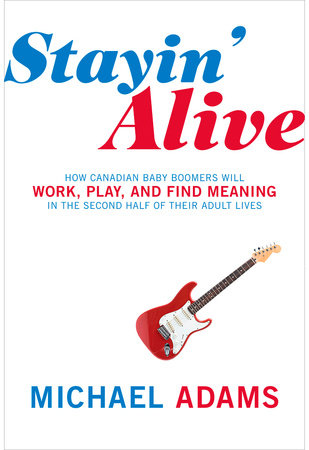
Unlikely Utopia: The Surprising Triumph of Canadian Multiculturalism
2008
Unlikely Utopia asks if the violence in the world at present— seemingly characterized by resurgent tribalism—refutes the idea that multicultural Canada can become a utopia. Our co-founder Michael Adams says no. With chapters on Quebec, Canada’s unique public attitudes toward diversity and multiculturalism, and an unprecedented survey of Muslim Canadians, Unlikely Utopia is a meditation on the future of Canada—a future of greater promise and human import than any Canadian might dare imagine.
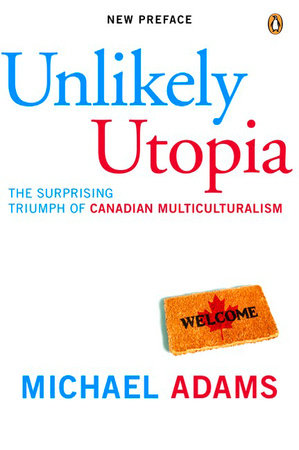
American Backlash: The Untold Story of Social Change in the United States
2006
American Backlash is a study relying on over 8,000 Social Values questionnaires, fielded in the United States from 1992 through 2004, exploring American values that go beyond the Red versus Blue dichotomy. Widening the lens to examine the psychology of American society as a whole, Michael Adams argues that it is neither Red nor Blue America that represents the overall trajectory of social change in the United States. Rather, it is that nearly half the population disengaged from politics that is the greatest barometer of where American society is headed.
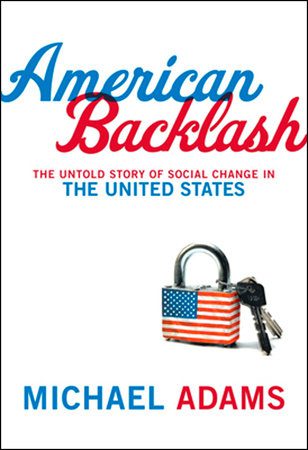
Fire & Ice: The United States, Canada & The Myth of Converging Values
2003
In this 2003 bestseller, Michael Adams offers the surprising argument that the values of Canadians and Americans are diverging in important ways. Relying on thousands of Social Values surveys conducted in Canada since 1983, and in the United States since 1992, Adams describes cross-border differences on matters ranging from religion, authority and the family, to entertainment, consumption and civic life. Fire and Ice offers an illuminating portrait of the evolving values of two nations separated at birth. The 2003 release, Fire and Ice: The United States, Canada, and the Myth of Converging Values, won the 2004 Donner Prize for best book on Canadian public policy and was chosen by the Literary Review of Canada as one of the 100 most important books ever published in Canada.
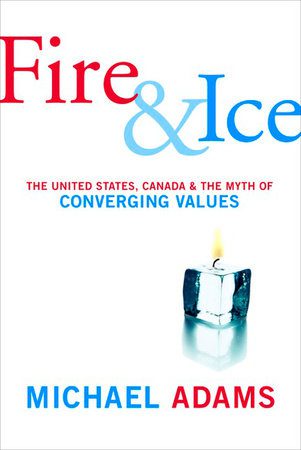
Better Happy Than Rich? Canadians, Money and the Meaning of Life
2001
In Better Happy Than Rich?, Michael Adams’ data reveal that the happiest Canadians are those who focus least on consumption and don’t view their financial status as a defining factor. In chapters such as “Making It,” “Spending It” and “Giving It Away,” Adams explores the relationship between how Canadians view the world and how they behave financially.
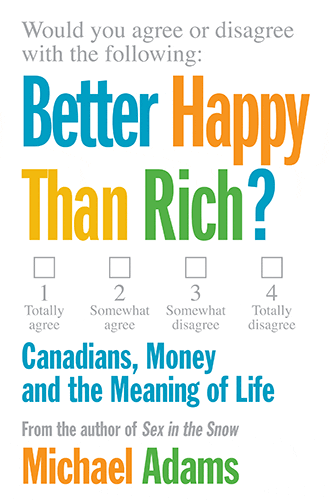
Sex in the Snow: The Surprising Revolution in Canadian Social Values
1997
In this 1997 bestseller, Michael Adams divides the population into 12 distinct Social Values “tribes” and argues that, for Canadians, demography is no longer destiny. In contemporary Canada, individuals’ identities are increasingly defined not by traditional demographic markers such as age, race, gender and class, but by their personal values and world views.
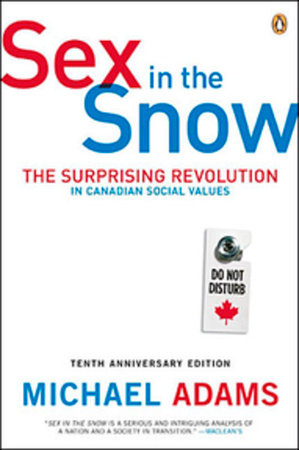
Explore Our Recent Featured Insights

Industry Trends
How the Niagara region can attract more Canadian travellers
12/18/25
Michele Cunningham

Industry Trends
How to Improve Ad Recall and Build Stronger Brand Awareness
11/10/25
Thais Saito

Social Values
What drives us to be die-hard fans of our Toronto Blue Jays?
10/24/25
Felicia Wirahardja



